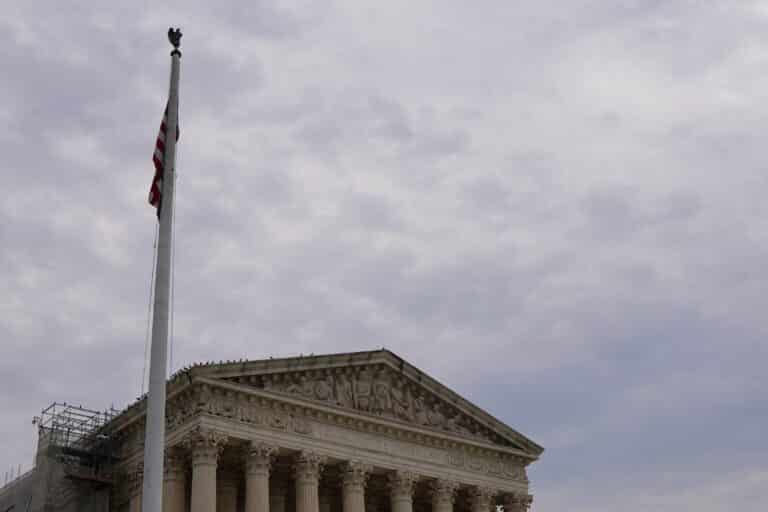The Supreme Court rejected yet another high-profile Second Amendment case, raising questions about its appetite for expanding gun rights.
On Monday, the justices denied cert in Wilson v. Hawaii, a case on appeal from the Hawaii Supreme Court concerning criminal gun charges against a man who carried a firearm without a permit in 2017. The charges came during an era when the state refused to grant gun permits to its citizens under a licensing regime later found unconstitutional by the Supreme Court in Bruen. The Hawaii court both intentionally and flagrantly rebuked the High Court in deciding to reinstate those charges based in part on the “Spirit of Aloha.”
Despite that, the Court allowed the decision to stand. The reasoning behind the denial is increasingly familiar.
“Although the interlocutory posture of the petition weighs against correcting this error now,” Justice Clarence Thomas wrote in a statement on the denial, joined by Justice Samuel Alito, “I would grant certiorari in an appropriate case to reaffirm that the Second Amendment warrants the same respect as any other constitutional right.”
The statement stands out for its similarity to others issued by the same few conservative justices on rejected gun cases over the last year. The Court as a whole does not reveal its thinking when it chooses not to take up a case. But statements like Thomas’s provide breadcrumbs that may lead back to what the rest of the Court is thinking about a given issue. Since Bruen was decided in 2022, Justices Thomas and Alito have been dropping a lot of them.
The first instance came shortly after Bruen, when policymakers in New York pushed back against that decision by passing a replacement concealed carry law that was, at least in some ways, stricter than what the Court had just struck down. A federal judge blocked broad swathes of the law, but the Second Circuit stayed that injunction and reinstated the law. When gun-rights advocates sought relief from the Supreme Court over a Second Amendment subject it had just willingly addressed a few months prior, the Justices declined to get involved. Justice Alito, joined by Justice Thomas, wrote separately in a statement respecting the denial.
“I understand the Court’s denial today to reflect respect for the Second Circuit’s procedures in managing its own docket, rather than expressing any view on the merits of the case,” Alito wrote. “Applicants should not be deterred by today’s order from again seeking relief if the Second Circuit does not, within a reasonable time, provide an explanation for its stay order or expedite consideration of the appeal.”
The next example came this July. The Seventh Circuit overturned a lower court’s preliminary injunction against the Illinois “assault weapons” ban in an opinion that ruled AR-15s and other targeted guns aren’t even “arms” under the Second Amendment. Gun rights advocates appealed to the Supreme Court, but the Justices again declined. Thomas wrote another statement citing the early stage of the case as the main reason the Court didn’t want to get involved.
“This Court is rightly wary of taking cases in an interlocutory posture,” he wrote. “But, I hope we will consider the important issues presented by these petitions after the cases reach final judgment. We have never squarely addressed what types of weapons are ‘Arms’ protected by the Second Amendment.”
All three examples fit a trend of a minority of conservative justices agreeing with the Court’s decision not to hear a given case due to its procedural posture while nevertheless agreeing with the petitioners on the constitutional infirmity of the law in question, in a sort of consolation opinion. The most recent examples have been particularly forthright in that regard.
Thomas referred to the Seventh Circuit’s Illinois AR opinion as “nonsensical” and “unmoored from both text and history.”
“If the Seventh Circuit ultimately allows Illinois to ban America’s most common civilian rifle, we can—and should—review that decision once the cases reach a final judgment,” he wrote. “The Court must not permit ‘the Seventh Circuit [to] relegat[e] the Second Amendment to a second-class right.’”
In the statement this week, he similarly accused the Hawaii Supreme Court of “ignor[ing] our holding” in Bruen.
“The decision below is the latest example of a lower court ‘fail[ing] to afford the Second Amendment the respect due an enumerated constitutional right,’” he wrote. “This Court’s intervention clearly remains imperative, given lower courts’ continued insistence on treating the Second Amendment ‘right so cavalierly.’”
While gun-rights advocates might appreciate Thomas’ sentiments, they’re no doubt disappointed not to see them in an actual majority opinion. It’s one thing to repeatedly write about the need to safeguard the Second Amendment against inadequate treatment from lower courts. It’s quite another to actually do it.
Aside from this week’s Wilson denial, where Justice Gorsuch joined with a similar statement, none of the other conservative justices have signed onto or issued any statements echoing Thomas and Alito’s sentiments. This could suggest that the Court’s view on this is not evenly distributed among the justices—or even just the conservative ones. After all, it only takes four votes to grant a cert petition, and only one to three conservatives have said anything about these post-Bruen Second Amendment challenges.
The lack of final judgment has been the common rationale cited for not taking another gun-rights case. Perhaps that’s truly what’s holding things up. Maybe the Court will take up a Second Amendment challenge once it gets a Goldilocks case.
However, it’s worth noting that the Court has, in the past, granted interlocutory appeals in other contexts. That means it isn’t necessarily a hard and fast rule. So, the conservative statements attached to these cert denials may be more cope about why the Court isn’t taking up these gun cases than confidence it soon will.
But if it is simply a matter of procedural posture, then the Justices will have an opportunity to quiet gun-rights advocates’ concerns when they consider whether to take up the challenge to Maryland’s “assault weapon” ban. That case, which is up on final judgment out of the Fourth Circuit, has been fully briefed and distributed for conference. It also concerns a subject matter that both Justices Thomas and Alito purportedly believe the Court urgently needs to review based on the outcome of the Illinois petition.
If it ultimately opts not to grant the case, gun-rights advocates will have to confront the prospect of a Court that doesn’t appear willing to further expound on the Second Amendment.







2 Responses
If SCOTUS denies cert on the Snope case or issues a ruling that anti-gun state governments can easily make an end run around, I don’t see how anyone can give them the benefit of the doubt moving forward.
My cynical side also tells me that both sides of our political establishment have concluded that it is in their respective best interests to keep arms bans and other draconian measures on the table as a potential policy choice. Democrats (wrongly) think they can win by running on gun control, Republicans (rightly) think they can win by running against it.
Snope is definitely the key case to watch right now.